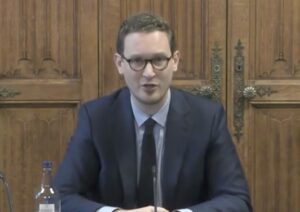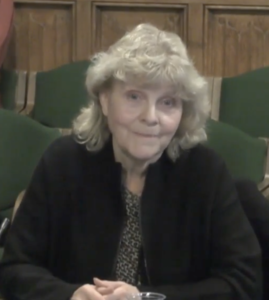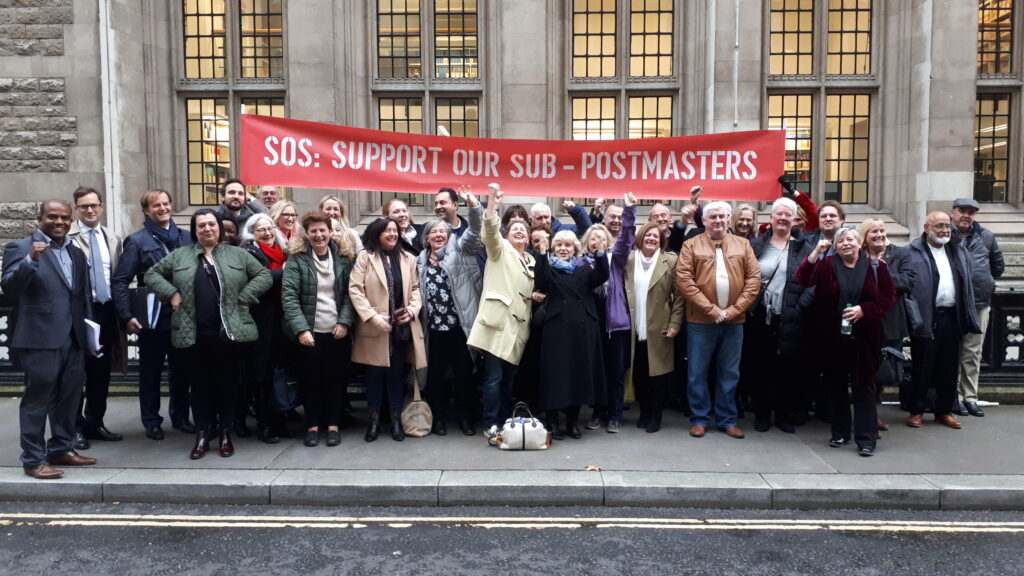
The continued unwillingness of any Post Office executive, past or present, to be interviewed by broadcast journalists on the subject of the Post Office Horizon scandal speaks volumes.
We hacks are therefore wholly reliant on MPs to do the job for us. Execs can refuse journalists’ interview requests with impunity. It is rather more difficult to turn down a parliamentary select committee, which has the power to summon people to attend.
If someone refuses a formal parliamentary summons, they can be held in contempt. Being in contempt of parliament could lead to fines or imprisonment, but as this entertaining article explains, neither has happened since 1880.
Nonetheless having “held in contempt of parliament” on their cv is not something any self-respecting CEO wants, so whilst they are happy to throw meaningless and sometimes misleading written statements at journalists, Post Office execs are required to submit to live questioning when parliament demands it.
On Tuesday next week, Nick Read, CEO of the Post Office, will face MPs on the Business, Energy and Industrial Strategy Select Committee to discuss the various compensation schemes available to Subpostmasters.
This in itself is something of a coup for Darren Jones, the chair of the BEIS Select Committee, who has somehow managed to resurrect his inquiry into the Post Office Horizon scandal, despite Sir Wyn Williams’ Statutory Inquiry running in parallel.

Mr Jones’ inquiry into the Post Office began in March 2020, but oral evidence sessions quickly came to a COVID-enforced halt. Whilst everyone was in lockdown, Jones sent three forensic letters to Vennells, Nick Read and Fujitsu, which elicited astounding responses, but the oral evidence sessions only got going again last month.
This was unexpected, given that whilst the select committee inquiry was effectively on hiatus, Sir Wyn Williams’ review-which-became-a-statutory-inquiry came about and was expected to take precedence.
Scope-a-dope
Nonetheless, on 14 December last year, up popped Alan Bates (founder of the Justice for Subpostmasters Alliance), Neil Hudgell (a lawyer with many Subpostmaster clients) and Jo Hamilton (a former Subpostmaster whose conviction has been quashed) all giving evidence to the BEIS select committee. At the start of the live evidence session, Mr Jones stated the reason he was able to keep his inquiry going was because he wanted to focus on “problems with compensation” and:

“Given that compensation was out of scope of the statutory inquiry, my Committee sought agreement from Sir Wyn Williams, the legal chair of the inquiry, to undertake today’s session with victims and representatives of victims, and a second session in the new year with Ministers and senior leaders from the Post Office.”
I don’t quite know what’s going on here, as Sir Wyn Williams, Alan Bates and various leading legal lights have all unequivocally stated that compensation is very much part of the statutory inquiry. Section 183 of the inquiry’s completed list of issues (under “Financial and Other Redress”) states:
“To what extent (if at all) has the creation and implementation of the Historic Shortfall Group Scheme and the Interim Compensation Scheme provided an adequate means for affected SPMs, managers and assistants to obtain financial redress for the wrongs which they have suffered?”
Sir Wyn then clarified to the legal firm Howe and Co:
“paragraph 183 of the Inquiry’s List of Issues is intended to consider whether all affected sub-postmasters, sub-postmistresses, managers, assistants, including the 555 Claimants in the group litigation of Alan Bates and Others v Post Office… were adequately compensated for the wrongs they had suffered.” [my emphasis]
Strangely, this is at odds with the Inquiry’s terms of reference which unequivocally states:
“The Horizon group damages settlement… and/or the engagement or findings of any other supervisory or complaints mechanisms… are outside the Inquiry’s scope.”
Quite how the group damages settlement can be outside the terms of reference but inside the list of issues is a mystery to me, but it seems Mr Jones has taken advantage of the confusion to get on with his job of trying to force someone… anyone… to account for this scandal.
Wrong Reading
On Tuesday, therefore, we will be treated to Nick Read, Post Office CEO, flying solo. Mr Read, imho, gave inadequate and something very close to misleading information to the committee in his written responses to Mr Jones’ letter in June 2020.
It still sticks in the craw that the line which came out of the Post Office after the 2019 High Court settlement was that the Horizon trial judgment did not make any findings as to any specific losses suffered by individual claimants. In his letter to Mr Jones in 2020, Mr Read repeats this. He says:
“the judgment did not determine whether bugs, errors or defects did in fact cause shortfalls in the individual claimants’ accounts but it found that they had the potential to create apparent discrepancies in postmasters’ branch accounts.”
This statement blatantly ignores the fact that:
a) specific losses to individual claimants was outside the judgment’s scope,
b) when the claimants’ IT teams asked the Post Office during the litigation to disclose information relating to losses in specific claimants branch accounts they were refused on the grounds it was out of scope,*
c) the full finding made by the judge was “It was possible for bugs, errors or defects of the nature alleged by the claimants to have the potential… to cause apparent or alleged discrepancies or shortfalls relating to Subpostmasters’ branch accounts… Further, all the evidence in the Horizon Issues trial shows not only was there the potential for this to occur, but it actually has happened, and on numerous occasions.” [my emphasis]
Somehow, Mr Read forgot to tell Mr Jones the last bit. I hope the committee will put the anomalies in Mr Read’s 2020 letter to him when they meet at 9.45am on Tuesday 11 Jan 2022, but I suspect all the questions will be about the current compensation fiasco.
HMG faces the music
After Mr Read’s session, at 10.30am on the same day, we will be treated to the triple threat of Paul Scully, Tom Cooper and Carl Creswell giving evidence to Mr Jones’ committee. We have heard a lot from minister Scully over the past two years, but Cooper and Creswell are a different kettle of fish. Both are civil servants. My only interaction with Carl Creswell was after his last appearance at a select committee hearing in 2019, when he tried to stop me talking to Tom Cooper.

Mr Cooper has been the government representative on the board of the Post Office since 2018, which means he is corporately responsible for the decision to pursue a disastrous, expensive and – some would say – immoral civil litigation strategy, which was based on outspending the (ultimately successful) claimants*, withholding (and sometimes mendaciously querying the existence of) crucial evidence* and trying to remove the judge from the case when he produced a judgment which the Post Office didn’t like.
Mr Cooper seems like a personable chap, and it is important to note that he was out of the room when the Post Office board discussed its litigation strategy, but that doesn’t mean he doesn’t share collective responsibility for decisions which ultimately ran the Post Office into the ground.
It is a mystery to me as to why Mr Cooper remains on the board of the Post Office given what has come to light over the past couple of years, but I guess that tells you all you need to know about the state of corporate accountability in this country. Incidentally, if you want to know what former Post Office CEO Paula Vennells thought of Mr Cooper’s input to board meetings whilst she was in charge, do have a read of the meaningless drivel she produced on the subject back in 2020.
Compensation latest
There are four groups of Subpostmasters demanding compensation:
1) The 494 civil litigants (555 minus the 61 with criminal convictions to overturn) bound by the group litigation settlement agreement which gave them paltry compensation whilst barring them from seeking further legal redress.
2) Those whose convictions have been quashed and who can now pursue the Post Office for malicious prosecution.
3) Those who were neither convicted nor part of the group litigation who have joined the Post Office’s Historical Shortfall Scheme.
4) Those who were neither convicted, nor part of the group litigation who haven’t joined the Historical Shortfall Scheme but who may choose to sue the Post Office in the civil courts after being forced to cover shortfalls in their branch accounts likely caused by Horizon.

Group 1 – the civil litigants
At the time of writing, the civil litigants in group 1) secured the following commitment from the Postal Service minister Paul Scully on 15 Dec 2021:
“I have said in my conversations with them and in correspondence that the settlement was full and final. However, I recognise what they have done and that none of this would have been possible without their work, and I will continue to work with them to see what we can do.”
Thin gruel after two years of campaigning, which has taken in several parliamentary debates, a complaint to the Parliamentary Ombudsman and a declaration by Alan Bates that the settlement agreement he signed on behalf of the 555 is not fit for purpose.
A new attempt to force the government’s hand has been led by former Subpostmaster and civil litigant Chris Head, who asked MPs to sign a letter demanding “justice and redress”:
The letter was circulated by his own MP Kate Osborne and attracted nearly 100 signatures. Ms Osborne has used the impetus generated by this letter to put down an Early Day Motion stating:
“the 555 litigants, who won civil proceedings against Post Office Ltd in 2018-19, should not be excluded from the Post Office Horizon compensation scheme; that the exclusion of these litigants from the compensation scheme is having and will continue to have a direct and devastating impact on these individuals and their families.”
At the time of writing the EDM has three signatures, but it only went up two days ago. Early Day Motions do not have any power to force the government to do anything.
Group 2 – those with quashed convictions
Those in group 2) whose convictions have been quashed (72 to date), are due millions in compensation for being victims of a miscarriage of justice so serious as to be an “affront to the public conscience” – a hard-won category, spearheaded by Seema Misra, Janet Skinner and Tracy Felstead and their legal advisors Paul Marshall, Flora Page and Aria Grace Law.
In July last year, the government announced that whilst those who had their convictions quashed were waiting for compensation, the government would give them them up to £100k as an advance (known as “interim payments”), on completion of a very suspicious-looking form, which asked all sorts of weird questions about their living circumstances. On 15 Dec 2021, Paul Scully told parliament:

“The Post Office has received 66 applications for interim payments. Of these, 62 offers have been made, and of those, 50 have been accepted and payments made. Payments made to date have all been for the maximum interim amount of £100,000.”
I know of two people who have applied for interim payments who have so far been denied. The Post Office is resisting making payouts in their cases for technical legal reasons.
As things stand the preferred method of the Post Office (and many Subpostmasters’ legal representatives) is to seek compensation through Alternative Dispute Resolution, a cheaper, quicker and more co-operative method of coming to a settlement. However, not a single case has yet been fully settled, due to what I understand is excessive foot-dragging by the Post Office. In December 2021, Paul Scully announced that the government would underwrite all payments to those with quashed convictions so that the Post Office can:
“finalise the arrangements that will enable the final settlement negotiations to begin as soon as possible.”
The fact we are now in 2022 with the Post Office just beginning to start final settlement negotiations seems very slow to me. As we know, many victims are elderly. Time is running out.
Group 3 – those on the Historical Shortfall Scheme
Although this should have been by far the most straightforward group, it’s rapidly turning into a farce. The Post Office was forced to set up the HSS by the terms of the 2019 civil litigation settlement agreement. It allowed those who had not been part of the group litigation to claim for money (and damages) without going through the courts.
The Post Office set up the scheme with a budget of £35m. Despite a very short window for applications (a matter of weeks in the summer of 2020 when most people were focused on keeping themselves and their families alive), the total number of claims reached 2400. The value of them exceeded £311m (when this figure was reached in early 2021, not all the claims had been assessed. The total sum of claims to the HSS has not yet been made public).
It is a measure of the incompetence of the Post Office board that they underestimated the eventual claims to the HSS by a factor of ten, which suggests that even by 2020 they still had no idea how much suffering the Horizon system and their actions had caused.
The total value of claims to the HSS meant that, for the Post Office, the jig was up. A business model based on unlawfully screwing money out of its own agents to remain solvent was closer to organised crime than sane and legitimate business practice, and the chickens had come home to roost. In April 2021 Nick Read went cap-in-hand to the government, explaining that the Post Office had run out of money. Without government intervention, it was bust.
Despite securing a government commitment to underwriting the HSS, the scheme itself seems opaque, unfair and dysfunctional, to the extent that further questions have been asked about it in the House of Commons, and dozens of applicants with serious claims have still not had an offer of meaningful compensation.
Group 4 – those who suffered losses outside all compensation schemes
These people are free to sue the Post Office, if they have the documentation and legal resources to do so. I know several people considering this, but no claim forms have yet gone in. If you are outside all compensation schemes and considering going through the courts to get what was taken from you, please get in touch, as it would be good to report your progress.
* Full details in The Great Post Office Scandal, available here.

Leave a Reply